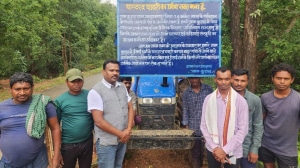The body in pain
Pragya Thakur’s allegation that she was tortured was seconded by the leader of the Opposition. Denial came from no less than the prime minister.

Pragya Thakur’s allegation that she was tortured was seconded by the leader of the Opposition. Denial came from no less than the prime minister. Unfortunately, the reputation of our police and security agencies regarding torture inspire credulity that will require more than the prime minister’s words to displace. One must be grateful to Advani for raising the issue at the highest political level. But as leader of Opposition and prime-minister-in-waiting, he cannot concern himself with Thakur’s case alone — he owes us all a duty to make efforts to stamp out torture.
A perusal of a report by the Asian Centre for Human Rights titled ‘Torture in India 2008: A State of Denial’ makes Thakur look almost fortunate in that her allegation received the attention it did. The report only backs up with evidence what most Indians already know anecdotally — that torture, rape and murder are routinely used by police and armed forces to extract confessions for crimes ranging from petty theft to terrorism, for refusal to pay bribes and as a counter-insurgency measure. Although expected, the report is no less nauseating. Consider one incident where the accused alleged that the officer ‘pushed pins under nail, even thrust chilly (sic) powder into anus and nose’. Similar findings have been made by several human rights NGOs for years, which are often backed by judicial inquiries and even admissions by governments (as the Andhra government recently admitted that several persons accused of the Hyderabad bomb blasts last year had been tortured). Some of these findings seem to indicate that the poor, dalits, religious minorities, hijras, street children and other marginalised groups are more likely to be tortured than others.
Torture, however, cannot be a partisan issue. Any incident of torture, whether against a Hindu or a Muslim, a man or a woman, a guilty or an innocent person, is wrong. The right against torture is one of the very few rights in international law that admit to no exception whatsoever. Even killing may be justified in exceptional circumstances (like self-defence), but not torture. It is the ultimate debasement of human nature. Even those of us who adopt a utilitarian moral calculus will only need to imagine ourselves being tortured. Most of us will admit to anything, true or false, in the face of torture, making it a worthless tool for any sincere endeavour to tackle crime (and comes at an enormous personal and civilisational cost). It is useful only to oppress and terrorise. Torture is particularly diabolical when committed with the sanction of the state, knowledge of the community and with complete impunity. In tolerating it silently, we are all complicit.
Surely Advani believes that Thakur’s alleged torture, if it took place, was wrong irrespective of her guilt or innocence, and irrespective of the fact that she is a Hindu sadhvi. If so, he must take the next logical steps to make torture institutionally unacceptable. To begin with, he must persuade his party to give up its demand of a POTA-like law which made confessions to police officers admissible as evidence. In regular criminal procedure, such confessions are not admissible for the fear that they might have been obtained through torture. POTA-like laws make the already bad situation on torture worse by indirectly legitimising it.
But this will only avoid further damage. The existing system itself needs to be fixed. India must ratify the United Nations Convention against Torture, which it signed in 1997 but has failed to ratify. Parliament must repeal section 197 of the Criminal Procedure Code and similar provisions which require prior governmental permission for prosecution of civil servants — these provisions have been the main vehicle for ensuring impunity for the torturers. It must also enact a special legislation criminalising torture and facilitating credible investigations and prosecutions. Comprehensive reform of the police and other security agencies is necessary to bring about transparency and accountability which inspire confidence rather than fear. The United Nations Special Rapporteur on Torture must be allowed to visit India (India is still to act upon a request made in 1993. China allowed the visit in 2005, a decade after the original request). To take his allegation in the Thakur case to its logical conclusion, Advani must make these demands on the present government and promise that his government, if elected, will act upon them.
Both the Congress and the BJP have criticised, in different instances, the alleged use of torture. If these criticisms were sincere, there is scope for exploring the possibility of bipartisan consensus to take necessary steps to eradicate the use of torture. Much of the rest of the world has, in word if not in deed, already arrived at the conclusion that torture is wrong. Full-stop. India must follow suit, in word and in deed.
The writer is a legal scholar at Oxford University



- 01
- 02
- 03
- 04
- 05




























